| Listing 1 - 10 of 19 | << page >> |
Sort by
|
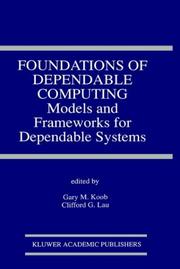
ISBN: 0792394844 9786610960279 1280960272 0585273774 9780792394846 Year: 1994 Publisher: Boston ; Dordrecht, The Netherlands ; London : Kluwer Academic Publishers,
Abstract | Keywords | Export | Availability | Bookmark
 Loading...
Loading...Choose an application
- Reference Manager
- EndNote
- RefWorks (Direct export to RefWorks)
Foundations of Dependable Computing: Models and Frameworks for Dependable Systems presents two comprehensive frameworks for reasoning about system dependability, thereby establishing a context for understanding the roles played by specific approaches presented in this book's two companion volumes. It then explores the range of models and analysis methods necessary to design, validate and analyze dependable systems. A companion to this book (published by Kluwer), subtitled Paradigms for Dependable Applications, presents a variety of specific approaches to achieving dependability at the application level. Driven by the higher level fault models of Models and Frameworks for Dependable Systems, and built on the lower level abstractions implemented in a third companion book subtitled System Implementation, these approaches demonstrate how dependability may be tuned to the requirements of an application, the fault environment, and the characteristics of the target platform. Three classes of paradigms are considered: protocol-based paradigms for distributed applications, algorithm-based paradigms for parallel applications, and approaches to exploiting application semantics in embedded real-time control systems. Another companion book (published by Kluwer) subtitled System Implementation, explores the system infrastructure needed to support the various paradigms of Paradigms for Dependable Applications. Approaches to implementing support mechanisms and to incorporating additional appropriate levels of fault detection and fault tolerance at the processor, network, and operating system level are presented. A primary concern at these levels is balancing cost and performance against coverage and overall dependability. As these chapters demonstrate, low overhead, practical solutions are attainable and not necessarily incompatible with performance considerations. The section on innovative compiler support, in particular, demonstrates how the benefits of application specificity may be obtained while reducing hardware cost and run-time overhead.
Electronic digital computers --- Real-time data processing --- Fault-tolerant computing --- Reliability --- Electronic digital computers -- Reliability. --- Fault-tolerant computing. --- Computer science. --- Microprocessors. --- Special purpose computers. --- Computer Science. --- Special Purpose and Application-Based Systems. --- Processor Architectures. --- Computer Science, general. --- Real-time data processing. --- Reliability. --- Software engineering. --- Electronic digital computers - Reliability
Book
ISBN: 270570325X 9782705703257 Year: 1980 Publisher: Boulogne-Billancourt : Editions Hommes et Techniques,
Abstract | Keywords | Export | Availability | Bookmark
 Loading...
Loading...Choose an application
- Reference Manager
- EndNote
- RefWorks (Direct export to RefWorks)
Electronic digital computers --- Debugging in computer science --- Computers --- Ordinateurs --- Débogage --- Reliability --- Access control --- Fiabilité --- Informatique --- Computer science --- Computer science. --- Electronic digital computers - Reliability --- Computers - Access control --- Computer system reliability
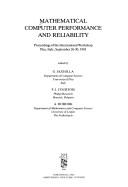
ISBN: 0444868925 9780444868923 Year: 1984 Publisher: Amsterdam North-Holland
Abstract | Keywords | Export | Availability | Bookmark
 Loading...
Loading...Choose an application
- Reference Manager
- EndNote
- RefWorks (Direct export to RefWorks)
Computer. Automation --- Electronic digital computers --- Computer networks --- Queuing theory --- Markov processes --- Numerical analysis --- Réseaux d'ordinateurs --- Markov, Processus de --- Analyse numérique --- Evaluation --- Mathematical models --- Congresses --- Reliability --- Congrès --- congresses --- Files d'attente, Théorie des --- Electronic digital computers - Evaluation - Mathematical models - Congresses --- Electronic digital computers - Reliability - Mathematical models - Congresses --- Computer networks - Congresses --- Queuing theory - congresses --- Markov processes - Congresses --- Numerical analysis - Congresses
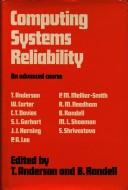
ISBN: 0521227674 9780521227674 Year: 1979 Publisher: Cambridge Cambridge University press
Abstract | Keywords | Export | Availability | Bookmark
 Loading...
Loading...Choose an application
- Reference Manager
- EndNote
- RefWorks (Direct export to RefWorks)
Computer architecture. Operating systems --- Computer programs --- Electronic digital computers --- Reliability --- -Electronic digital computers --- -681.3*D2 --- Automatic digital computers --- Computers, Electronic digital --- Digital computers, Electronic --- Computers --- Hybrid computers --- Sequential machine theory --- Computer program files --- Files, Computer program --- Program files, Computer --- Programs, Computer --- Computer files --- Computer software --- Software engineering: protection mechanisms; standards--See also {681.3*K63}; {681.3*K51} --- 681.3*D2 Software engineering: protection mechanisms; standards--See also {681.3*K63}; {681.3*K51} --- 681.3*D2 --- Computer programs - Reliability --- Electronic digital computers - Reliability
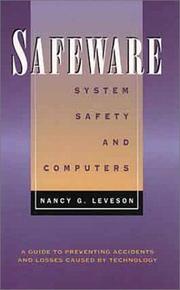
ISBN: 0201119722 9780201119725 Year: 1995 Publisher: Reading (Mass) : Addison-Wesley,
Abstract | Keywords | Export | Availability | Bookmark
 Loading...
Loading...Choose an application
- Reference Manager
- EndNote
- RefWorks (Direct export to RefWorks)
Computer software --- Electronic digital computers --- Industrial safety --- Logiciels --- Ordinateurs --- Sécurité du travail --- Reliability --- Fiabilité --- Industrial safety. --- Reliability. --- -Electronic digital computers --- -Industrial safety --- Industrial accidents --- Industries --- Job safety --- Occupational hazards, Prevention of --- Occupational health and safety --- Occupational safety and health --- Prevention of industrial accidents --- Prevention of occupational hazards --- Safety, Industrial --- Safety engineering --- Safety measures --- Safety of workers --- Accidents --- System safety --- Automatic digital computers --- Computers, Electronic digital --- Digital computers, Electronic --- Computers --- Hybrid computers --- Sequential machine theory --- Software, Computer --- Computer systems --- Prevention --- Sécurité du travail --- Fiabilité --- Computer software. Reliability --- Electronic digital computers. Reliability
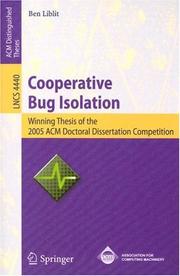
ISBN: 9783540718772 354071877X 9786610865727 1280865725 3540718788 Year: 2007 Publisher: Berlin, Heidelberg : Springer Berlin Heidelberg : Imprint: Springer,
Abstract | Keywords | Export | Availability | Bookmark
 Loading...
Loading...Choose an application
- Reference Manager
- EndNote
- RefWorks (Direct export to RefWorks)
Efforts to understand and predict the behavior of software date back to the earliest days of computer programming,over half a century ago. In the intervening decades, the need for effective methods of understanding software has only increased; so- ware has spread to become the underpinning of much of modern society, and the potentially disastrous consequences of broken or poorly understood software have become all too apparent. Ben Liblit’s work reconsiders two common assumptions about how we should analyze software and it arrives at some striking new results. Inprinciple,understandingsoftware is not such a hardproblem. Certainlya c- puter scientist studying programs appears to be in a much stronger position than, say, a biologist trying to understand a living organism or an economist trying to understand the behavior of markets, because the biologist and the economist must rely on indirect observation of the basic processes they wish to understand. A c- puterscientist, however,starts with a complete,precise descriptionof the behaviorof software—the program itself! Of course, the story turns out not to be so straightf- ward, because despite having a perfect description, programs are suf ciently c- plex that it is usually dif cult or even impossible to answer many simple questions about them.
Computer software --- Computer programming --- Evaluation --- Mathematical models. --- Management. --- Computer software -- Reliability. --- Computers -- Reliability. --- Electronic books. -- local. --- Computer Science --- Engineering & Applied Sciences --- Management --- Information Technology --- Software Engineering --- Computers --- Reliability. --- Computer reliability --- Computer science. --- Software engineering. --- Algorithms. --- Computer logic. --- Computer Science. --- Software Engineering/Programming and Operating Systems. --- Software Engineering. --- Logics and Meanings of Programs. --- Algorithm Analysis and Problem Complexity. --- Computer science logic --- Logic, Symbolic and mathematical --- Algorism --- Algebra --- Arithmetic --- Computer software engineering --- Engineering --- Informatics --- Science --- Foundations --- Logic design. --- Computer software. --- Software, Computer --- Computer systems --- Design, Logic --- Design of logic systems --- Digital electronics --- Electronic circuit design --- Logic circuits --- Machine theory --- Switching theory --- Computer programming management --- Programming management (Electronic computers)
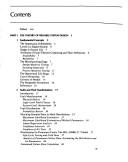
ISBN: 0932376134 9780932376138 Year: 1982 Publisher: Bedford [Massachusetts] : Digital Press,
Abstract | Keywords | Export | Availability | Bookmark
 Loading...
Loading...Choose an application
- Reference Manager
- EndNote
- RefWorks (Direct export to RefWorks)
Electronic digital computers --- Fault-tolerant computing --- Reliability --- Ordinateurs --- Tolérance aux fautes (informatique) --- Fiabilité --- -Fault-tolerant computing --- 681.3*C4 --- 681.3*D4 --- Computing, Fault-tolerant --- Electronic data processing --- Fault tolerance (Engineering) --- Computer system failures --- Automatic digital computers --- Computers, Electronic digital --- Digital computers, Electronic --- Computers --- Hybrid computers --- Sequential machine theory --- Performance of systems (Computer systems organization) --- Operating systems--See also {681.3*C} --- Fault-tolerant computing. --- Reliability. --- 681.3*D4 Operating systems--See also {681.3*C} --- 681.3*C4 Performance of systems (Computer systems organization) --- Fiabilité. --- Electronic digital computers - Reliability --- Tolérance aux fautes (informatique) --- Fiabilité.
Book
ISBN: 3642213928 3642213936 Year: 2011 Publisher: Berlin : Springer,
Abstract | Keywords | Export | Availability | Bookmark
 Loading...
Loading...Choose an application
- Reference Manager
- EndNote
- RefWorks (Direct export to RefWorks)
Dependability analysis is the recent approach to performance evaluation of contemporary systems which tries to cope with new challenges that are brought with their unprecedented complexity, size and diversity. Especially in case of computer systems and networks such evaluation must be based on multidisciplinary approach to theory, technology, and maintenance of systems which operate in real (and very often unfriendly) environments. As opposed to “classic” reliability which focuses mainly on technical aspects of system functioning, dependability studies investigate the systems as multifaceted and sophisticated amalgamations of technical, information and also human resources. This monograph presents selected new developments in such areas of dependability research as mathematical models, evaluation of software, probabilistic assessment, methodologies, tools, and technologies. Intelligent and soft computing methods help to resolve fundamental problems of dependability analysis which are caused by the fact that in contemporary computer systems it is often difficult to find a relation between system elements and system events (the relation between reasons and results) and it is even more difficult to define strict mathematical models with “analytical” relationships between such phenomena.
Electronic digital computers -- Reliability. --- Fault-tolerant computing. --- Real-time data processing. --- Engineering & Applied Sciences --- Computer Science --- Computer systems --- Reliability. --- ADP systems (Computer systems) --- Computing systems --- Systems, Computer --- Engineering. --- Artificial intelligence. --- Computational intelligence. --- Computational Intelligence. --- Artificial Intelligence (incl. Robotics). --- Intelligence, Computational --- Artificial intelligence --- Soft computing --- AI (Artificial intelligence) --- Artificial thinking --- Electronic brains --- Intellectronics --- Intelligence, Artificial --- Intelligent machines --- Machine intelligence --- Thinking, Artificial --- Bionics --- Cognitive science --- Digital computer simulation --- Electronic data processing --- Logic machines --- Machine theory --- Self-organizing systems --- Simulation methods --- Fifth generation computers --- Neural computers --- Construction --- Industrial arts --- Technology --- Electronic systems --- Cyberinfrastructure --- Artificial Intelligence.
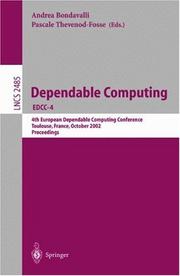
ISBN: 3540000127 3540360808 9783540000129 Year: 2002 Volume: 2485 Publisher: Berlin, Heidelberg : Springer Berlin Heidelberg : Imprint: Springer,
Abstract | Keywords | Export | Availability | Bookmark
 Loading...
Loading...Choose an application
- Reference Manager
- EndNote
- RefWorks (Direct export to RefWorks)
It was with great pleasure that, on behalf of the entire organizing committee, I welcomed participants to EDCC-4, the Fourth European Dependable Computing Conference, held for the ?rst time in France. The fourth issue of EDCC carried on the traditions established bythe previous conferences in this series: EDCC-1 was held in Berlin (Germany) in October 1994, EDCC-2 in Taormina (Italy) in October 1996, and EDCC-3 in Prague (Czech Republic) in September 1999. EDCC evolved from a merger of tow other conference series at the moment when the Iron Curtain fell. One of these, known as the ”International Conf- ence on Fault-Tolerant Computing Systems”, was organized during the period 1982–1991, bythe German Technical Interest Group ”Fault-Tolerant Computing Systems”. The other series, known as the ”International Conference on Fault- Tolerant Systems and Diagnostics”, was organized during the period 1975–1990 in the former Czechoslovakia, Poland, Bulgaria, and the former GDR. The c- position of the EDCC steering committee and the organizing committees of the successive issues of the conference have mirrored the East–West uni?cation ch- acter of the conference series. The EDCC conference is becoming a unique meeting point for researchers and practitioners from all over the world in the ?eld of Dependable Systems. It is organized bythe SEE Working Group ”Dependable Computing” in France, the GI/ITG/GMA Technical Committee on Dependabilityand Fault Tolerance in Germany, and the AICA Working Group ”Dependability of Computer Systems” in Italy. Furthermore, committees of several global professional organizations, such as IEEE and IFIP, support the conference.
Fault-tolerant computing --- Electronic digital computers --- Reliability --- Computer science. --- Computer hardware. --- Special purpose computers. --- Computer system failures. --- Software engineering. --- Computers. --- Computer Science. --- Theory of Computation. --- Computer Science, general. --- Computer Hardware. --- Special Purpose and Application-Based Systems. --- System Performance and Evaluation. --- Software Engineering. --- Information theory. --- Computer system performance. --- Computer software engineering --- Engineering --- Informatics --- Science --- Communication theory --- Communication --- Cybernetics --- Automatic computers --- Automatic data processors --- Computer hardware --- Computing machines (Computers) --- Electronic brains --- Electronic calculating-machines --- Electronic computers --- Hardware, Computer --- Computer systems --- Machine theory --- Calculators --- Cyberspace --- Computer failures --- Computer malfunctions --- Failure of computer systems --- System failures (Engineering) --- Special purpose computers --- Computers --- Failures --- Fault-tolerant computing - Congresses --- Electronic digital computers - Reliability - Congresses
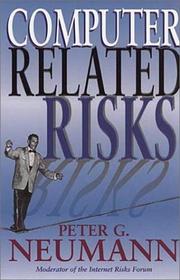
ISBN: 020155805X 9780201558050 Year: 1995 Publisher: Reading (Mass.) Addison-Wesley
Abstract | Keywords | Export | Availability | Bookmark
 Loading...
Loading...Choose an application
- Reference Manager
- EndNote
- RefWorks (Direct export to RefWorks)
Electronic digital computers --- Risk management --- Reliability --- -Risk management --- #KVIV:BB --- 681.3*C20 --- 681.3*D46 --- 681.3*K61 --- Insurance --- Management --- Automatic digital computers --- Computers, Electronic digital --- Digital computers, Electronic --- Computers --- Hybrid computers --- Sequential machine theory --- Computerwetenschap--?*C20 --- Security and protection: access controls; authentication; cryptographic controls; information flow controls; security kernels; verification (Operating systems) --- Project and people management: life cycle; staffing; systems analysis and design; systems development; training (Management of computing and information systems) --- 681.3*K61 Project and people management: life cycle; staffing; systems analysis and design; systems development; training (Management of computing and information systems) --- 681.3*D46 Security and protection: access controls; authentication; cryptographic controls; information flow controls; security kernels; verification (Operating systems) --- 6813*C20 --- Electronic digital computers - Reliability
| Listing 1 - 10 of 19 | << page >> |
Sort by
|

 Search
Search Feedback
Feedback About UniCat
About UniCat  Help
Help News
News